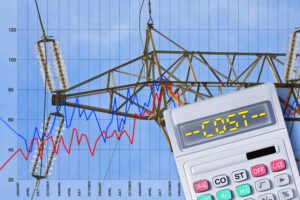Smart meters rapidly change how homeowners manage their electricity and natural gas usage. This advanced technology has the potential to revolutionize our approach to understanding energy consumption patterns, ultimately leading to greater efficiency and cost reductions. In this blog post, we will explore how smart meters transform home energy management, offering invaluable insights into our daily habits and enabling us to make informed decisions for greener living and lower expenses.
Traditional meters often leave us with limited information about our electricity and natural gas usage, making it challenging to create accurate budgets and detect inefficiencies in our energy consumption. On the other hand, smart meters provide real-time monitoring of energy usage, giving homeowners detailed insights into their daily habits and empowering them to make data-driven decisions toward more efficient energy consumption.
Smart meters not only offer environmental benefits through improved resource management but also enable utility companies to streamline their operations. With the ability to remotely monitor and control home energy usage, smart meters facilitate more efficient grid management, reduce labor costs, and contribute to overall service improvements. For homeowners, this means greater peace of mind, knowing that they’re actively participating in creating a sustainable energy system while also saving money on their utility bills.
Apart from real-time monitoring, smart meters open doors to innovative energy plans and pricing structures that incentivize users to actively manage their consumption patterns. For instance, time-of-use (TOU) pricing encourages homeowners to shift their energy-intensive activities to off-peak hours when energy prices are lower. This helps utility companies balance demands on the grid and encourages conscious energy usage among consumers, leading to financial savings and reduced environmental impacts.
In this post, we will dive into smart meters, exploring their benefits, functionalities, and potential drawbacks. We’ll also explore innovative ways to make the most out of this technology in managing home utilities and reducing costs. By unlocking the power of smart meters, you have an incredible opportunity to make a positive impact on your wallet and the environment, contributing to a greener, more sustainable future for all Canadians.
Smart Home Technology for Energy Management: A Guide to Cost Savings and Efficiency
Understanding the Role of Smart Home Technology in Energy Management
Homeowners are increasingly turning to smart home technology as an effective solution to enhance energy management within their living spaces. To harness the full potential of smart devices, it’s essential to gain a comprehensive understanding of their role in energy management:
- Real-Time Monitoring: Smart home devices provide real-time data on your home’s energy consumption, allowing you to identify patterns, set goals, and track progress toward improved energy efficiency.
- Automation and Scheduling: Program your devices to automatically perform energy-saving actions, such as reducing thermostat temperatures when you’re away or scheduling lights to turn on and off based on occupancy.
- Remote Access and Control: Access and control your smart devices from anywhere through mobile applications, enabling you to make energy management adjustments no matter where you are.
- Efficiency Optimization: Many smart devices are designed to optimize their performance, ensuring that energy consumption is minimized while maintaining high performance and comfort levels.
Implementing Effective Energy Management Strategies with Smart Home Technology
Smart home technology can have a profound impact on your household’s energy consumption. Consider the following strategies to make the most of your devices:
- Set Energy-Saving Goals: Establish clear, attainable goals for reducing energy consumption in your home, and use your smart devices to help you achieve them.
- Create Schedules and Automations: Automate energy-saving tasks and routines, such as adjusting thermostat settings or turning off lights when rooms are unoccupied.
- Encourage Family Participation: Involve the entire household in your energy management efforts, ensuring each family member understands the smart devices’ functions and how they contribute to cost savings and efficiency.
- Regularly Evaluate Progress: Assess your home’s energy consumption trends and the effectiveness of your smart devices regularly to determine which areas require further improvement or optimization.
Investing in the Right Smart Home Devices for Your Needs
While a vast array of smart home devices are available in the market, it’s crucial to select the ones that align with your specific energy management needs and preferences. Consider the following factors when shopping for smart devices:
- Determine Your Priorities: Assess your household’s energy consumption patterns and needs, allowing you to identify the devices that will provide the most significant cost savings and efficiency improvements.
- Compatibility and Integration: Ensure your chosen devices are compatible with your existing home systems and can be seamlessly integrated into your daily routine.
- Consider Future Expansion: Opt for expandable and versatile devices, enabling you to adjust and upgrade your smart home ecosystem as your needs change.
- Read Reviews and Seek Recommendations: Consult product reviews and recommendations from trusted sources to ensure you invest in high-quality, reliable devices.
Maximizing the Long-Term Benefits of Smart Home Technology for Energy Management
To fully benefit from the long-term cost savings and efficiency improvements offered by smart home technology, it’s essential to adopt best practices and maintain your devices:
- Regular Maintenance: Ensure your smart devices are well-maintained, clean, and up-to-date with the latest firmware updates to preserve optimal performance and energy-saving capabilities.
- Ongoing Learning and Adaptation: Stay informed about new technologies and industry developments. Be open to updating and refining your smart home system as innovations emerge.
- Periodic Assessment and Upgrades: Reassess the effectiveness of your smart home technology over time and be prepared to upgrade or replace devices as necessary to maintain peak energy efficiency.
- Utilize Community Resources: Participate in online forums and local groups focusing on smart home technology and energy management, providing valuable information, advice, and support to optimize your system.
Conclusion
Embracing smart home technology for energy management presents a unique opportunity to optimize your household’s energy consumption, resulting in significant cost savings and a more eco-friendly lifestyle. By carefully selecting the right devices and strategically integrating them into your daily routine, you can enjoy their convenience and efficiency benefits.
As with any technological endeavor, staying informed and adapting to innovations is crucial for long-term success. By maintaining a proactive approach and regularly assessing the performance of your smart home system, you can ensure that your home remains at the forefront of energy efficiency, comfort, and sustainability.
Take control of your energy bills with Muvar’s best energy plans. Say goodbye to unpredictable bills and switch to our reliable and affordable energy plans today. With Muvar, you can choose from various energy plans that suit your lifestyle and budget. Our plans are designed to keep you powered up without breaking the bank.





